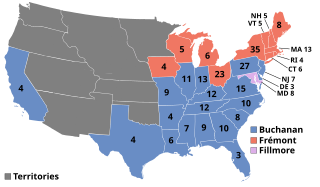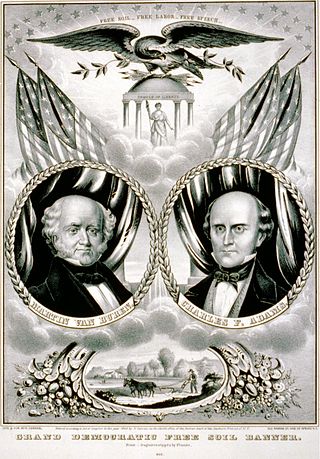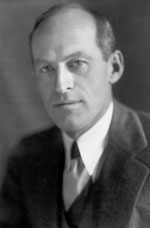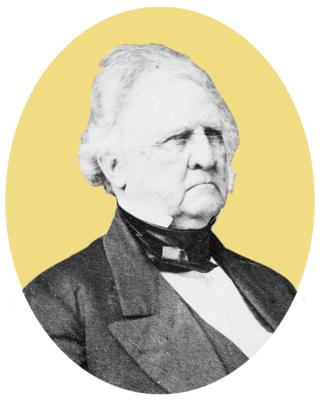Related Research Articles
The Whig Party was a conservative political party that existed in the United States during the mid-19th century. Alongside the slightly larger Democratic Party, it was one of the two major parties in the United States between the late 1830s and the early 1850s as part of the Second Party System. Four presidents were affiliated with the Whig Party for at least part of their terms. Other prominent members of the Whig Party include Henry Clay, Daniel Webster, Rufus Choate, William Seward, John J. Crittenden, and John Quincy Adams. The Whig base of support was centered among entrepreneurs, professionals, planters, social reformers, devout Protestants, and the emerging urban middle class. It had much less backing from poor farmers and unskilled workers.

The Anti-Masonic Party was the earliest third party in the United States. Formally a single-issue party, it strongly opposed Freemasonry in the United States. It was active from the late 1820s, especially in the Northeast, and later attempted to become a major party by expanding its platform to take positions on other issues. It declined quickly after 1832 as most members joined the new Whig Party; it disappeared after 1838.

The 1856 United States presidential election was the 18th quadrennial presidential election, held on Tuesday, November 4, 1856. In a three-way election, Democrat James Buchanan defeated Republican nominee John C. Frémont and Know Nothing nominee Millard Fillmore. The main issue was the expansion of slavery as facilitated by the Kansas–Nebraska Act of 1854. Buchanan defeated President Franklin Pierce at the 1856 Democratic National Convention for the nomination. Pierce had become widely unpopular in the North because of his support for the pro-slavery faction in the ongoing civil war in territorial Kansas, and Buchanan, a former Secretary of State, had avoided the divisive debates over the Kansas–Nebraska Act by being in Europe as the Ambassador to the United Kingdom.

The Free Soil Party was a short-lived coalition political party in the United States active from 1848 to 1854, when it merged into the Republican Party. The party was largely focused on the single issue of opposing the expansion of slavery into the western territories of the United States.

Abigail Fillmore, wife of President Millard Fillmore, was the first lady of the United States from 1850 to 1853. She began work as a schoolteacher at the age of 16, where she took on Millard Fillmore, who was two years her junior, as a student. She continued her teaching work after their marriage in 1826 until the birth of her son Millard Powers Fillmore in 1828. She lived in Buffalo, New York, while her husband advanced his political career in Albany, New York, and Washington, D.C. She would occasionally join him in these cities, becoming involved in local social life. She became the second lady of the United States in 1849 after her husband was elected vice president on the Whig Party presidential ticket, and she became the first lady of the United States in 1850 after her husband succeeded to the presidency.

William Orlando Butler was a U.S. political figure and U.S. Army major general from Kentucky. He served as a Democratic congressman from Kentucky from 1839 to 1843, and was the Democratic vice-presidential nominee under Lewis Cass in 1848.

Millard Evelyn Tydings was an American attorney, author, soldier, state legislator, and served as a Democratic Representative and Senator in the United States Congress from Maryland, serving in the House from 1923 to 1927 and in the Senate from 1927 to 1951.

The 1856 Whig National Convention was a presidential nominating convention held from September 17 to September 18, in Baltimore, Maryland. Attended by a rump group of Whigs who had not yet left the declining party, the 1856 convention was the last presidential nominating convention held by the Whig Party. The convention nominated a ticket consisting of former President Millard Fillmore and former Ambassador Andrew J. Donelson; both had previously been nominated by the 1856 American National Convention. The Whig ticket finished third in the 1856 presidential election behind the winning Democratic ticket of James Buchanan and John C. Breckinridge, the runner-up Republican ticket of John C. Fremont and William L. Dayton.

The 1852 Whig National Convention was a presidential nominating convention held from June 16 to June 21, in Baltimore, Maryland. It nominated the Whig Party's candidates for president and vice president in the 1852 election. The convention selected General-in-Chief Winfield Scott for president and U.S. Secretary of the Navy William A. Graham for vice president.

The 1848 Whig National Convention was a presidential nominating convention held from June 7 to 9 in Philadelphia. It nominated the Whig Party's candidates for president and vice president in the 1848 election. The convention selected General Zachary Taylor of Louisiana for president and former Representative Millard Fillmore of New York for vice president.

The Know Nothing party was a nativist political party and movement in the United States in the mid-1850s. The party was officially known as the "Native American Party" prior to 1855; thereafter, it was simply known as the "American Party". Members of the movement were required to say "I know nothing" whenever they were asked about its specifics by outsiders, providing the group with its colloquial name.

The presidency of Millard Fillmore began on July 9, 1850, when Millard Fillmore became President of the United States upon the death of Zachary Taylor, and ended on March 4, 1853. Fillmore had been Vice President of the United States for 1 year, 4 months when he became the 13th United States president. Fillmore was the second president to succeed to the office without being elected to it, after John Tyler. He was the last Whig president. His presidency ended after losing the Whig nomination at the 1852 Whig National Convention. Fillmore was succeeded by Democrat Franklin Pierce.
Manton Marble (1835–1917) was a New York journalist. He was the proprietor and editor of the New York World from 1860 to 1876.

Millard Powers Fillmore was an American lawyer. He was one of two children, and only son, of U.S. President Millard Fillmore and his first wife, Abigail Powers.

Millard Fillmore was the 13th president of the United States, serving from 1850 to 1853, the last to be a member of the Whig Party while in the White House. A former member of the U.S. House of Representatives from upstate New York, Fillmore was elected as the 12th vice president in 1848, and succeeded to the presidency in July 1850 upon the death of Zachary Taylor. Fillmore was instrumental in passing the Compromise of 1850, a bargain that led to a brief truce in the battle over the expansion of slavery. He failed to win the Whig nomination for president in 1852 but gained the endorsement of the nativist Know Nothing Party four years later and finished third in the 1856 presidential election.

At 2:15 a.m. Eastern Time on September 20, 1881, Chester A. Arthur was inaugurated the 21st president of the United States. The inauguration marked the commencement of Chester A. Arthur's only term as president. The presidential oath of office was administered by New York Supreme Court Justice John R. Brady at Arthur's private residence in New York City. Two days later, Arthur underwent a second inauguration ceremony in Washington, D.C., with the oath administered by Morrison Waite, the Chief Justice of the United States. Arthur became president following the death of his predecessor James A. Garfield, who had been assassinated by a troubled office seeker, Charles J. Guiteau.
Events from the year 1849 in the United States.

Nathaniel Fillmore Jr. was an American farmer. He was the father of Millard Fillmore, the 13th president of the United States. A native of Vermont, Nathaniel Fillmore farmed in Bennington until he was in his mid-twenties when his brother Calvin and he moved to western New York. Duped by unscrupulous land agents, their titles proved defective and they lost their new farms. Nathaniel Fillmore became a tenant farmer and occasionally taught school; his family's circumstances were so dire that they sometimes relied on the charity of their landlords to survive.
William Chatfield Micou was an American lawyer who was active in Augusta, Georgia, and New Orleans, Louisiana. He was also an unsuccessful nominee to the United States Supreme Court at the end of the Millard Fillmore administration.
References
- 1 2 Gray Williams (2006). New Castle: Chappaqua and Millwood. Arcadia Publishing. pp. 104–. ISBN 978-0-7385-3928-7.
- ↑ Judith A. Ranta (2003). The Life and Writings of Betsey Chamberlain: Native American Mill Worker. UPNE. pp. 51–. ISBN 978-1-55553-564-3.
- ↑ Mary Cortona Phelan (1957). Manton Marble of the New York World. Catholic University of America Press.
- ↑ Kenneth Whyte (2009). The Uncrowned King: The Sensational Rise of William Randolph Hearst. Counterpoint. pp. 78–. ISBN 978-1-58243-467-4.
- ↑ Talcott Williams (1922). The Newspaperman. C. Scribner's Sons. pp. 158–.
- ↑ Daniel W. Crofts (15 April 2010). A Secession Crisis Enigma: William Henry Hurlbert and "The Diary of a Public Man". LSU Press. pp. 153–. ISBN 978-0-8071-3739-0.